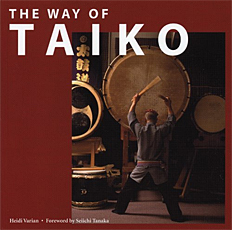"When I first saw taiko, I was moved by its intensity. Every beat was in the moment. The concentration and the emotional power of the performers were tantamount to their skill. That's what I enjoyed about it. Doing it myself never crossed my mind. Not once.
"You see, those were the days when San Francisco Taiko Dojo practiced in the basement of the Japantown YMCA, back in the 1980s. It was a glorified storage closet, with asbestos ceiling fragments coming down with the vibration of the beats. Excellent form could knock out the hanging light bulbs. The small room smelled of sweat and blood from the rigorous training of Seiichi Tanaka. The drummers beat on tires. The actual drums were too honored and expensive and were only played in performance.
"I was only there to pick up my friend who was a part of the dojo. After many appearances at the dojo, picking up or dropping off the group on tours and generally lending a hand (due to my proximity), I was invited by Seiichi Tanaka to join the ensemble. Of course, I declined. Repeatedly. It was never a question of cultural background, for even though taiko is a traditional Japanese art, Seiichi Tanaka's group is multicultural, to symbolize his belief in 'Frontier Spirit.' It was because it looked completely out of my league. I was a runway model, did some TV. I certainly didn't feel powerful and intense. I don't know what changed my mind, but one day I believed Sensei Tanaka when he said, 'You can do this.'
"The most amazing part of taiko comes when you reach your limit and pass beyond it. Sensei Tanaka is a difficult teacher and one that many fear, for his dreaded 'Tanaka style.' But he is observant of all his students, always testing them, whether they know it or not. The dojo is his life, his family, his world. He pushes his students further than they can go, to reach a goal that he can see. Maybe you, the student, cannot.
"Taiko has taught me more than Japanese drumming and traditions. It has taught me focus and concentration From the study of taiko, I have learned humility, and also pride. In my years with Seiichi Tanaka and San Francisco Taiko Dojo, I have toured Europe, America, and Japan. I was the first woman and non-Japanese to perform the Norito (sacred prayer) at the Suwa Shrine in Japan. I have appeared in films, on national television, in magazines, on radio, and in a book. I have taught taiko as therapy to disabled children and adults. I have taught in correctional institutions. I have taught preschoolers. I have built instruments, made regalia, helped to create new ensembles. I still play in school assemblies regularly. I have passed many limits, but there are always new challenges, and I am always a student. I am no expert, I only have experience."
